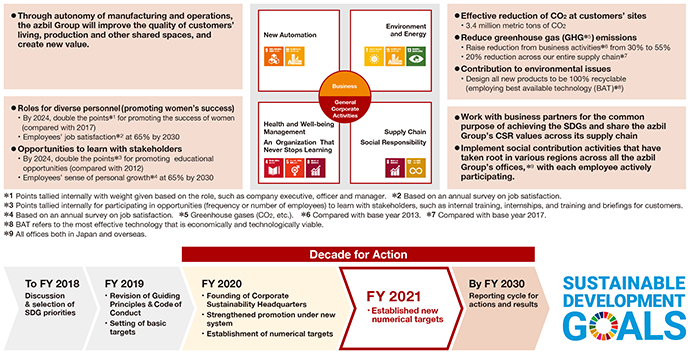Achieving a Sustainable Society by Following the SDG Guideposts
New SDG targets and strengthened initiatives, with the SDGs serving as important indicators of progress for management
Positioning the SDGs as important management guideposts, the azbil Group as a whole has been working on its four goals for 2030 throughout its business and corporate activity in order to bring about a sustainable society. Along with the formulation of new long-term targets for 2030 and a new medium-term plan, the azbil Group has added new targets to strengthen its efforts by taking concrete measures to achieve the Group’s goals for the SDGs. Action aimed at achieving the new targets will be expanded to the entire worldwide azbil Group, and through the SDGs we will provide value to our customers.
- Setting new targets in a "Decade for Action" to expand SDG activity to the entire Group
- Contributing to customers' SDG action through our business
- Each employee working on the SDGs as a personal challenge
Setting new targets in a "Decade for Action" to expand SDG activity to the entire Group
Guided by its philosophy of "human-centered automation," Azbil Corporation has been actively contributing to the conservation of the Earth's environment by helping customers to improve productivity through automation and by energy efficiency measures throughout its businesses of Building Automation, Advanced Automation, and Life Automation.
Since the Sustainable Development Goals*1 were adopted by the United Nations in 2015, the azbil Group has positioned these goals as important management guideposts for achieving a sustainable society. Accordingly, the Guiding Principles for azbil Group Business and the azbil Group Code of Conduct were revised to incorporate the concept of the SDGs in 2019. In the same year the azbil Group also set its SDG-related targets for (1) environment and energy, (2) new automation, (3) supply chain and CSR, and (4) health and well-being management and "an organization that never stops learning." Since then, the Group has increased its efforts, with 2019 as its "first year of the SDGs."
In 2020, the Sustainability Promotion Headquarters was established in order to strengthen these efforts, which until then had been implemented separately by each department, in an integrated way. Setting the decade until 2030 as the "Decade for Action," the headquarters announced new targets and has been actively working toward them. It cooperates with existing committees as a management office, mainly with the SDG Promotion Committee, which formulates an overall strategy and works for more effective action using the PDCA cycle to achieve the 2030 goals, and cooperates also with the working groups established for each of the four goals. In the SDG promotion meeting, top management and overseas employees, whose number will be gradually increased, work together to spread the SDGs throughout the domestic and overseas azbil Group companies.
Contributing to customers' SDG action through our business
In May 2021, the azbil Group set new long-term targets for 2030 and made a new 2021–2024 medium-term plan for achieving the goals. In addition, the Group revised the four Essential Goals of the azbil Group for the SDGs, which had been set in order to make contributions "in series" to the achievement of a sustainable society, in line with the new medium-term plan. Also, it added new SDG targets and raised the level of the existing targets that had been announced.
In the environment and energy area, the azbil Group through its business is helping customers to reduce greenhouse gas (GHG)*2 emissions at their sites in order to solve their energy-related problems, preserve the environment, and work toward a decarbonized society. In 2020, we cut 2.94 million metric tons of CO2. This equals about one four hundredth of the total CO2 emissions in Japan for a year (about 1.2 billion metric tons), which translates to a reduction of about 170 times the CO2 emissions from the azbil Group's business activities for 2020 (17,000 metric tons). By 2030, we will expand this reduction to 3.4 million metric tons of CO2 per year. Also, the target for reducing GHG emissions (scopes*3 1 + 2) from business activities was revised from 30% (from a 2013 base year)*4 to 55% (from a 2017 base year). The former target (30%) was certified in 2019 by the SBT initiative*5 for the goal of keeping global temperature increase below 2 degrees Celsius. The new target was reapproved in August 2021 by the SBT initiative for the goal of holding the increase to 1.5 degrees Celsius.
In addition, for resource recycling and reduction of waste generation, we aim to design all new products to be 100% recyclable and added this as a new target. Many of our conventional products use parts that combine multiple materials, which makes them difficult to recycle. Within the range of the best available technology (BAT*6) and starting at the stage of designing products, we will work on product manufacturing that is aware of final disposal issues so that customers can properly disassemble, separate, and recycle our products.
In the area of new automation, we will use IoT, big data, and AI technology to create autonomous manufacturing systems that make judgments and decisions that were previously difficult to automate, aiming at dramatically improving productivity and achieving safety and dependability. For example, Azbil's BiG EYES™ online anomaly monitoring system uses AI and big data to catch slight changes in plant operation and quickly detect anything unusual to prevent problems. Another example is the Virtual Planner™ production planning and modification system. Equipped with AI, the system derives optimal solutions for scheduling and allocation and can minimize planning time and loss due to long lead time or redundant costs, and also can handle sudden changes of plan. Using this kind of technology, we aim to help people focus on more creative roles and generate value.
Each employee working on the SDGs as a personal challenge
In the area of supply chain and social responsibility, we set two new targets in order to fulfill our responsibilities together with our business partners and to contribute to society in various places.
After checking the methods of external ESG evaluation agencies, we set target areas for encouraging business partners' efforts based on 10 items. We evaluate using a four-tiered system: direction, framework, initiatives, and effectiveness, and collaborate with our partners in addressing environmental and societal problems in the supply chain. Another new target is for all azbil Group offices to take part in activity that contributes to society and is rooted in regional characteristics, and for each employee to participate in the activity. In April 2021, the Social Contribution Office was established to strengthen efforts to preserve the Earth's environment and nurture the next generation in Japan and abroad.
In the area pertaining to the goal of "health and well-being management, an organization that never stops learning," the azbil Group aims to strengthen its foundations for solving the problems of society by raising the levels of job satisfaction, health, diversity, and inclusion, and by continuous learning. In addition to a variety of measures implemented on the basis of the employee satisfaction survey, the new targets include expansion of the opportunities for women's achievements by 2024, creation of workplaces where diverse people can demonstrate their abilities, continuous development of personnel who can play an active role globally, and increased opportunities for learning together with stakeholders. In the azbil Group, the founder's idea of "freeing people from drudgery" has been inherited by the Group's philosophy of "human-centered automation" and its goal of contributing to society to increase human happiness. The azbil Group intends to achieve the four azbil Group goals toward achieving SDGs and continue to work at customers' sites and offices to make contributions that lead "in series" to a sustainable society and to achieve sustainable growth.

The azbil Group’s essential goals and steps toward achieving the SDGs
*1 Sustainable Development Goals
International goals adopted at a United Nations summit in 2015 for the period from 2016 to 2030. Seventeen goals and 169 targets were established in order to achieve a sustainable, diverse, and inclusive society where no one will be left behind.
*2 Greenhouse gas (GHG)
A general term for gases in the atmosphere that cause a "greenhouse effect" by absorbing part of the infrared radiation emitted from the Earth's surface.
*3 Scope
Greenhouse gas emissions from business activity in a business's supply chain. Scope 1 refers to direct GHG emissions from a business (from burning fuel and industrial processes). Scope 2 refers to indirect GHG emissions from the use of electricity, heat, or steam provided by another business. Scope 3 refers to all indirect emissions other than scopes 1 and 2, which corresponds to upstream (procurement) and downstream (after shipment) business activity.
*4 2013 base year
The goals officially approved by the SBT initiative are based on the fiscal year, for both base year and target year, and years are written as fiscal years for these goals.
*5 SBT initiative
A group established by CDP, the World Resources Institute (WR), the World Wide Fund for Nature (WWF), and the United Nations Global Compact (UNGC) to promote the achievement of greenhouse gas emission reduction goals. It is an international initiative to certify that a company's CO2 emission reduction goals are consistent with scientific evidence. The 1.5 degree Celsius goal aims to keep the global average temperature increase (caused by climate change) to 1.5 ℃ compared to pre-industrial levels.
*6 Best available technology (BAT)
The most effective technology that is both economically and technologically viable.
BiG EYES and Virtual Planner are trademarks of Azbil Corporation
This article was published on July 1, 2022.



